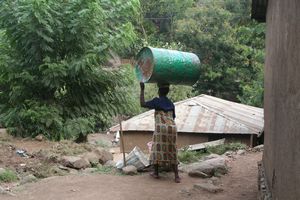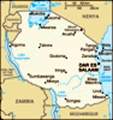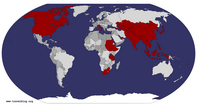Advertisement

 Photo 2
Photo 2
a woman walking by during an interviewThe last few days of my trip was a blur of reading multiple versions of my survey, scrambling to find electricity and internet access, (I’m starting to think a solar powered laptop charger would come in real handy) and driving down countless bumpy dirt roads. I sat in on a pretest of an interview in Mwanza with a semi-English-speaking interviewer named Felicia. The woman being interviewed was probably in her early 20s—married in the past year. She was shy and humble, which seems to be the typical demeanor of women here. Not sure if it’s my presence that makes them self-conscious or if that is generally how they are, but women my age or below seem to be very quiet and hesitant. Even when I hang out with other women as friends or with groups of their own friends, they are often just sitting there quietly smiling.
Anyway, Felicia, the respondent, and I sat on rocks on the side of a hill outside of the woman’s home, which was made of mud bricks and a dirt floor. I was able to follow the interview with the few Kiswahili words I know. The respondent seemed to be very knowledgeable about HIV,

 Photo 3
Photo 3
neighborhood kids being kidsbut when it came to questions about sexual relationship power, it was clear she had next to none (“Your partner would get violent if you asked him to use a condom.” Agree. “Your partner gets more of your relationship than you do.” Agree. “Your partner always wants to know where you are.” Agree.)
The interviewed lasted about an hour. Various people walked by, some of them muttering something about the mzungu. At one point a herd of goats (including several babies) came scampering by and climbed up the large rocks behind us. An older woman walked by with a huge barrel on her head. The men in the next house were using hooked tools to cut grasses.
After the interview, Felicia and I carefully walked back out to the road stepping over rocks and trash. A little old woman with lots of wrinkles and few teeth was sitting on the side selling mangoes and lemons. She said something to Felicia about walking away without saying anything to her. So I said, “Shikamoo, Mama.” She grinned a toothless grin and started rattling away in Kiswahili. I was immediately lost.
On the way back to meet our team, Felicia

 Photo 4
Photo 4
neighborhood kids being nosytold me how her father wanted her to be circumcised (the survey touches on both male and female circumcision). She comes from a region in the northern most part of the country called Mara. Her sister was circumcised—how much I am not sure. She told me it was just a little bit, but that could either mean the hood of the clit was cut away or the entire clit was removed. In its more extreme form, female circumcision/genital mutilation involves removing a woman’s labia and clit and sewing the vaginal opening shut. While not completely widespread in Tanzania, there are some regions and tribes where it is practiced regularly.
Felicia told me that her sister is now at the university and is having severe problems. She feels sick a lot (infections?), is self-conscious about her vagina, and is convinced she will never find a fiancé. As a result, she stays away from men altogether out of fear of rejection. This was the second time I felt nauseous this week. Felicia said she refused her father’s orders to be circumcised. How that went over with her family and community, I am not sure, as the rest was lost in translation.

 Photo 5
Photo 5
neighborhood kids being curiousBut Felicia is one of the most confident and modern Tanzanian women I have met. I was very impressed by her.
The interviewers, particularly women, are worried about the gender-based violence section of this survey. Many of them have only done surveys about market research or media usage, so asking another woman whether she’s ever been forced into sex makes them uncomfortable. During our debriefing, one interviewer revealed that her respondent, who was pregnant, reported being beaten by her husband. A pregnant woman! What kind of man does such a thing?! Clearly not a man at all… So I spent a great bit of time going over how to make a respondent feel comfortable and what to do if someone breaks down crying or asks for help.
This is probably the hardest part of my job. And the most taxing. I’ve sat in on interviews in other countries where the women start crying while talking about having to go into sex work to escape an abusive situation or dealing with a husband who treats the woman like a mere piece of property. I usually feel numb during the whole thing. In fact, Ken has learned to expect a sort of decompression process when I come home from these trips—I sometimes end up crying in the shower once I’m back in my own house and alone and it all starts to sink in. The emotional toll of the trip just hits me all at once and literally brings me to my knees.
On a lighter note, I’m confident the interviews will go well, and I’m grateful I was able to be there for 2 of the 3 regional trainings. I met some great people who could possibly be recruited for my own little stand-by research team. They seem excited about the work we are doing and are taking it very seriously. My challenge has been convincing them that this research is not just to please the white American woman, but that it is important for the development of programs that will help their communities. They should not just be doing what I ask because it is what I ask, but because it will help to move Tanzanian communities towards progress and development.
Every day after work this week I went to visit a group of kids living in a friend’s neighborhood. I finally got them to call me by my name instead of mzungu, but they pronounce it “Michelle-o”. Last night I brought pencils and sharpeners and they went crazy with excitement. “Michelle-o! Michelle-o! Michelle-o! Tank you!” Again, the little girls were left in the dust trying to fight past all the boys, but I made sure to put a pencil into each of their little hands.
I swear one of the kids swiped my iphone, as its been missing ever since. Very annoying, although if they can sell it, it will feed their family for weeks. But that makes for two electronics that left me this trip—my kindle also disappeared, and a book I would never purchase was charged to it a few days later. Both the iphone and kindle are highly coveted items, as they are not available here. Next time I will have to keep everything strapped to me at all times. I am also being super careful with my MacBook, as I get a lot of questions about it.
The other highlight of this week has been getting in on the gossip of my Tanzanian friends. For some reason I was surprised that all of the issues people from my culture deal with are the same as those in Tanzanian culture—betrayals by friends, possessive lovers, dreams of business opportunities, lack of fulfillment in current jobs. And they handle the situations in similar ways.
This trip was nice in that I am finally at the point where I am used to the lack of electricity, the dirt roads, mosquitoes, and now even the language. I can finally focus on really learning how the people operate rather than on my own survival in a foreign land. And it’s been an incredibly rewarding experience. I have developed a group of friends that I can joke with and tease and talk to about all sorts of topics—African politics, American politics, gender norms, how mental illness manifests itself in different cultures, and even office gossip. They like hearing me speak, “deep English,” and I like learning Swahili slang. One evening I sat in an office drinking cokes with a group of men while we talked about how involved men should be in the childbearing process. It was enlightening for all of us.
Tanzania is nice in that I feel safe here. Yes, I had a couple of things stolen this time, but overall I feel very safe walking the dirt roads myself and showing up in a local joint with no other foreigners in site. Whenever I worked in South Africa and went into the field, you would always be expecting to be car jacked or robbed at gun or knife-point. But Tanzanians are very peaceful, generally. They move on Swahili time, they enjoy life, and they will stop and talk to you just to find out what your story is and what you’re doing that day. They even say things like, I will be there after 30 minutes, meaning, it will be at least 30 minutes, as you never know if I will meet someone on the road that will want to have a conversation before passing.
Admittedly, I am still uncomfortable when people stare at me when in a part of town where whites are a rarity, especially when I am trying to navigate the rough roads. But I don’t feel like I am being paraded around like a trophy by my local friends. People seem to genuinely enjoy my company, learn from me, and like to teach me about their culture. I even had some friends give me what they call “culture gifts”—necklaces and sandals that resemble traditional Tanzanian culture—so that I can take them back to my country and show others. “I hope you will not forget us, Michelle, because we will not forget you.”
How could I? I have officially fallen in love with this country.
Advertisement
Tot: 0.068s; Tpl: 0.011s; cc: 12; qc: 28; dbt: 0.0424s; 1; m:domysql w:travelblog (10.17.0.13); sld: 1;
; mem: 1.1mb










